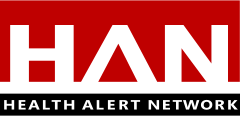HAN 365: CDC Ebola Update #1
Distributed via the CDC Health Alert Network
August 13, 2014, 12:00 ET (12:00 PM ET)
HANINFO-00365
Summary
The Centers for Disease Control and Prevention (CDC) is working with other U.S. government agencies, the World Health Organization, and other domestic and international partners in an international response to the current Ebola outbreak in West Africa. This document summarizes key messages about the outbreak and the response. It will be updated as new information becomes available and distributed regularly. Please share the document with others as appropriate.
Background
CDC has activated its Emergency Operations Center to respond to Ebola. Below, please find resources and guidance that we hope will be useful to you and your organization. Please share with your colleagues and networks.
In this HAN INFOService
- Ebola Cases and Deaths (West Africa)
- Online Resources
- Key Messages Summary
Ebola Cases and Deaths (West Africa)
Updated: August 9, 2014
- Suspected and Confirmed Case Count: 1848
- Suspected Case Deaths: 1013
- Laboratory Confirmed Cases: 1176
Updates on cases and deaths can be found on the CDC website:
http://www.cdc.gov/vhf/ebola/outbreaks/guinea/index.html
Online Resources
Web Resources
What's New
Ebola Hemorrhagic Fever
Questions and Answers on Ebola
World Health Organization’s Epidemic and Pandemic Alert and Response (EPR)
Interim Guidance about Ebola Virus Infection for Airline Flight Crews, Cleaning Personnel, and Cargo Personnel (Updated)
Ebola Virus Disease Information for Clinicians in U.S. Healthcare Settings (NEW)
COCA Call: What U.S. Hospitals Need to Know to Prepare for Ebola Virus Disease (NEW)
Digital Press Kit (NEW)
Radio Spots for Outbreak
Infographics (English and Spanish) (NEW)
Outbreak Map
@CDCgov
@CDCEmergency
@CDCTravel
@CDC_NCEZID
@CDC_eHealth
@CDCGlobal
Like us on Facebook
CDC
CDC Emergency Preparedness and Response
CDC Travelers’ Health
Summary Key Messages
- This is the largest Ebola outbreak in history and the first in West Africa.
- The outbreak in West Africa is worsening, but CDC, along with other U.S. government agencies and international partners, is taking steps to respond to this rapidly changing situation.
- Ebola poses no substantial risk to the U.S. general population.
- On August 8, the World Health Organization (WHO) declared that the current Ebola outbreak is a Public Health Emergency of International Concern (PHEIC).
- The PHEIC declaration underscores the need for a coordinated international response to contain the spread of Ebola.
- Information about the PHEIC declaration is available on the WHO website www.who.int/mediacentre/news/statements/2014/ebola-20140808/en/#.
- A person infected with Ebola virus is not contagious until symptoms appear.
- The virus is spread through direct contact (through broken skin or mucous membranes) with the body fluids (blood, urine, feces, saliva, and other secretions) of a person who is sick with Ebola, or with objects like needles that have been contaminated with the virus, or infected animals.
- Ebola is not spread through the air or by food or water.
- As of August 13, no confirmed Ebola cases have been reported in the United States, other than the two U.S. health workers evacuated from Liberia.
- As a precaution, CDC is communicating with American healthcare workers about how to isolate patients with known and suspected cases of Ebola and how they can protect themselves from infection.
- Early recognition of Ebola is important for providing appropriate patient care and preventing the spread of infection. Healthcare providers should be alert for and evaluate any patients suspected of having Ebola.
- A case definition for Ebola virus disease is available at www.cdc.gov/vhf/ebola/hcp/case-definition.html.
- CDC and its partners at U.S. ports of entry are not doing enhanced screening of passengers traveling from the affected countries. However, CDC works with international public health organizations, other federal agencies, and the travel industry to identify sick travelers arriving in the United States and take public health actions to prevent the spread of communicable diseases.
- CDC also is assisting with exit screening and communication efforts in West Africa to prevent sick travelers from getting on planes.
- CDC recommends that people avoid nonessential travel to Guinea, Liberia, and Sierra Leone.
- CDC recommends that people practice enhanced precautions if traveling to Nigeria.
- Recommendations and guidance may change as new information becomes available.
The Centers for Disease Control and Prevention (CDC) protects people's health and safety by preventing and controlling diseases and injuries; enhances health decisions by providing credible information on critical health issues; and promotes healthy living through strong partnerships with local, national and international organizations.
Department of Health and Human Services
HAN Message Types
- Health Alert: Conveys the highest level of importance; warrants immediate action or attention. Example: HAN00001
- Health Advisory: Provides important information for a specific incident or situation; may not require immediate action. Example: HAN00346
- Health Update: Provides updated information regarding an incident or situation; unlikely to require immediate action. Example: HAN00342
- Info Service: Provides general information that is not necessarily considered to be of an emergent nature. Example: HAN00345
###
This message was distributed to state and local health officers, state and local epidemiologists, state and local laboratory directors, public information officers, HAN coordinators, and clinician organizations.
###
Additional Resources
- Page last reviewed: August 13, 2014
- Page last updated: August 13, 2014
- Content source:
- Division of Emergency Operations (DEO); Office of Public Health Preparedness and Response (OPHPR)
- Maintained By:


 ShareCompartir
ShareCompartir
